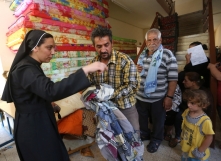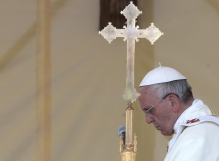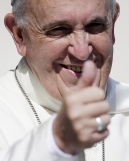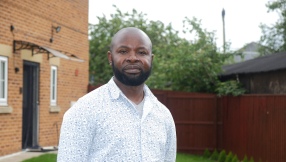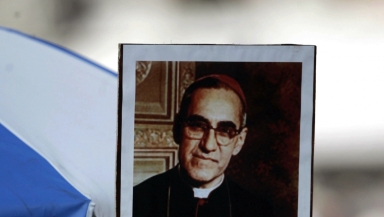
Pope Francis has lifted a ban on the beatification of the Salvadorian Archbishop murdered in 1980 for challenging the right-wing government.
Archbishop Oscar Arnulfo Romero's beatification was blocked by the Catholic Church as he was thought to have held Marxist beliefs.
A Vatican offical announced on Sunday that Pope Francis had 'unblocked' the path towards Romero's sainthood.
Francis confirmed the decision, saying that it had been "blocked by prudence".
"For me Romero is a man of God," the pontiff said as he spoke to journalists on the plane back from his visit to South Korea. He added that he hoped the beatification would happen quickly.
Archbishop Romero was a strong supporter of liberation theology – a politically nuanced reading of scripture that concentrates on the needs of the poor.
He is a contentious figure in the Catholic Church, because this theology can be seen to oppose all hierarchical structures and institutions – including the Church. Both Pope Francis' predecessors had upheld the ban on his beatification.
Romero's vocal opposition to the right-wing Salvadorian government was a response to its brutal treatment of the rural poor in the late 1970s, which included mass killings and torture.
But while he made some enemies, he was loved by the people and crowds would gather to hear his sermons.
Romero would regularly broadcast sermons in which he listed the US-backed government's abuses and demanded an end to the repression. He also refused to attend government functions.
In 1980 he wrote an open letter to US President Jimmy Carter, asking him to end the military support for the regime.
He wrote: "The contribution of your government instead of promoting greater justice and peace in El Salvador will without doubt sharpen the injustice and repression against the organisations of the people which repeatedly have been struggling to gain respect for their most fundamental rights."
His opposition to the government cost him his life, when he was shot dead by during a mass on 24 March 1980. On 23 March Romero had told soldiers that they were killing their own people, saying "No soldier is obliged to obey an order that is contrary to the will of God."
Just before he was shot, he said in his homily: "One must not love oneself so much, as to avoid getting involved in the risks of life that history demands of us, and those that fend off danger will lose their lives."
No one has ever been convicted of Romero's murder.
He was buried in San Salvador Cathedral, and his death is commemorated by large crowds gathering in the streets every year.
He is one of the 75,000 who were killed in El Salvador's bloody civil war which went on from 1980 to 1992. Of a population of 5.5 million people, one million fled the country, and another million were made homeless.
Beatification is part of the process towards sainthood. It recognises the person as someone who has lived a faithful or holy life. After beatification they are known as 'blessed' and can be venerated by Catholics but, unlike canonisation, it is not required.
Those who have been martyred are fast-tracked to this stage, irrespective of whether they have performed miracles. To be canonised, however, it must be shown that miracles have been worked through the person's intercession.
One question over Archbishop Romero's beatification is whether he was killed for his left-wing ideology or for his faith.
Born in 1917, Romero began a career as an apprentice carpenter at 13, but felt called into the priesthood and left home the following year to attend seminary. He was ordained in 1942 and became a bishop in 1970.
He was not a popular choice when he was made Archbishop in 1977, as his opposition to Vatican reforms had marked him out as conservative. As a result, his outspoken support for the people came as a surprise.
He dated his change of heart to his tenure as bishop of Santiago de Maria, where he witnessed the suffering of the landless poor.










